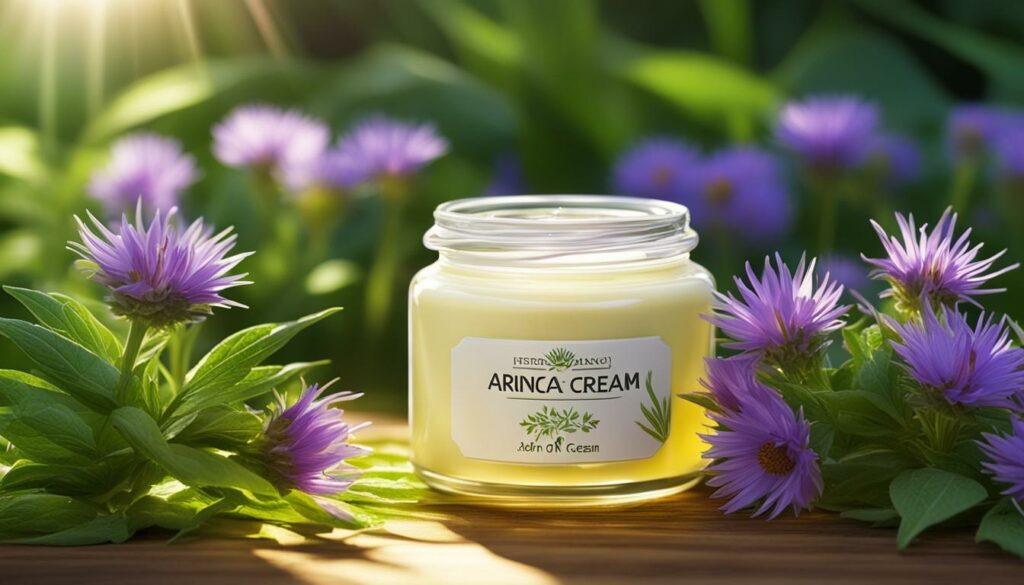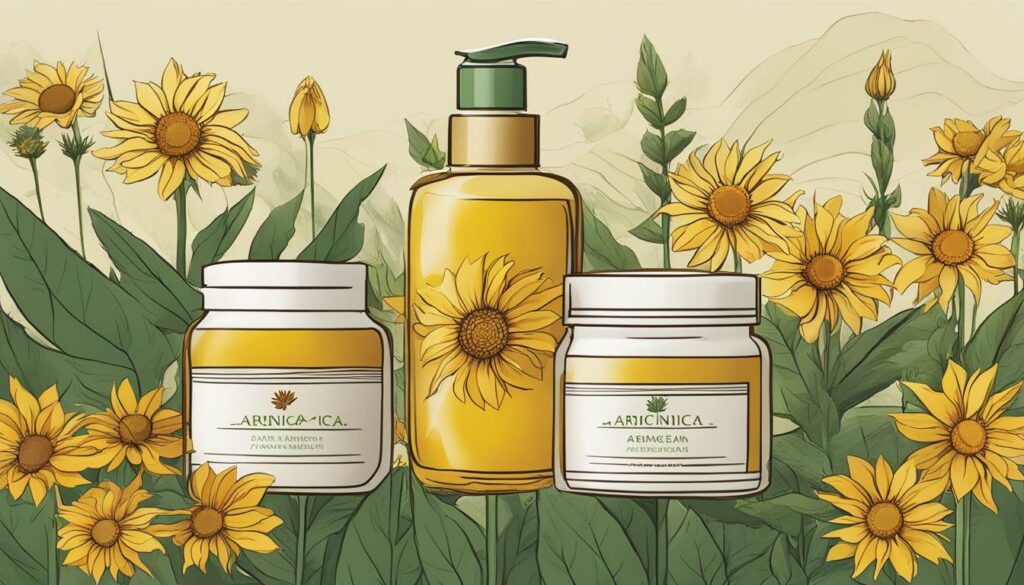Welcome to our article on the uses of arnica! If you’re looking for a natural solution to pain relief, bruise healing, inflammation reduction, muscle soreness, skincare, healing wounds, relieving arthritis symptoms, or promoting hair growth, arnica may be just what you need. This powerful herb, known for centuries for its medicinal properties, offers a range of benefits. In this article, we will explore the various uses of arnica and how it can help you achieve optimal well-being.
What is Arnica?
Arnica montana, also known as Leopard’s bane, is a perennial herb that has been used for centuries in traditional medicine. This beautiful plant, with its vibrant yellow-orange flowers, is native to the mountains of Europe and Siberia and can now be found cultivated in North America as well.
Arnica montana has a striking resemblance to daisies and typically reaches a height of 1 to 2 feet. Both the fresh and dried flower heads of this remarkable herb are utilized in medicinal preparations.

These vivid yellow-orange flowers not only add a touch of visual appeal to any landscape, but they also hold incredible healing properties that have made arnica a popular choice in natural remedies.
| Common Name | Scientific Name | Habitat | Flower Color |
|---|---|---|---|
| Arnica | Arnica montana | Mountains of Europe and Siberia, Cultivated in North America | Yellow-orange |
Arnica montana, also known as Leopard’s bane, is a perennial herb that has been used for centuries in traditional medicine. It grows in the mountains of Europe and Siberia and is cultivated in North America. The plant has yellow-orange flowers that resemble daisies and can reach a height of 1 to 2 feet. Both fresh and dried flower heads are used in medicinal preparations.
Topical Uses of Arnica
Arnica is a versatile herb widely used in various topical preparations to alleviate muscle aches, reduce inflammation, and promote wound healing. Its effectiveness has made it a popular choice for treating a range of conditions, including sprains, bruises, joint pain, insect bites, and even broken bones. Whether you prefer the convenience of creams, ointments, liniments, salves, or tinctures, arnica is available in various forms to suit your needs.
One of the key benefits of arnica is its ability to relieve muscle aches. When applied directly to the affected area, arnica penetrates deep into the muscles, providing soothing relief and facilitating recovery. For those experiencing inflammation, arnica’s anti-inflammatory properties help to reduce swelling and discomfort. This makes it an excellent choice for individuals dealing with conditions such as arthritis or sports-related injuries.
Another notable use of arnica is in promoting wound healing. Arnica has a long history of aiding in the healing process and has been used for centuries to treat wounds of various types. Whether you have a minor cut, scrape, or burn, applying arnica topically can help accelerate the healing process and minimize scarring.
But its benefits don’t end there. Studies have shown that arnica may also have the potential to help in the treatment of burns. Its soothing properties and ability to reduce inflammation can provide relief and aid in the healing of burns of varying degrees.
Fun fact: Did you know that arnica is not only beneficial for muscle aches and wound healing but also for promoting hair growth? Some studies suggest that arnica may stimulate hair follicles, leading to healthier and faster-growing hair.

Choosing the Right Arnica Product
When it comes to selecting the right arnica product for your needs, it is essential to consider your preferences and the specific condition you are treating. Here are some popular forms of arnica and their benefits:
| Product | Benefits |
|---|---|
| Arnica Cream/Ointment | Easy to apply, ideal for localized pain relief |
| Arnica Liniment | Provides cooling effect and deep penetration for muscle relief |
| Arnica Salve | Rich and nourishing, great for dry or damaged skin |
| Arnica Tincture | Concentrated form, suitable for dilution or custom blending |
It’s important to note that while arnica is generally considered safe for topical use, it should not be applied to open wounds without the supervision of a healthcare professional. If you have any concerns or questions about using arnica, consult with a healthcare professional for personalized guidance.
Tip: Before trying any new arnica product, it’s a good idea to perform a patch test to check for any allergic reactions or skin sensitivities.
Now that you understand the topical uses of arnica and the various forms available, you can confidently explore the range of arnica products to find the one that best suits your needs. Harness the power of arnica to experience the natural healing properties that this remarkable herb offers.
Homeopathic Uses of Arnica
Homeopathic remedies of arnica are a popular choice for addressing sore muscles, bruises, and other conditions resulting from overexertion or injury. These remedies are highly diluted and are considered safe for internal use when taken according to the recommended dosage found on the label. To ensure your safety and achieve the desired results, it is important to consult a healthcare professional before using homeopathic arnica.
Homeopathic arnica remedies are available in various forms, including pills, topical applications, and injectables. By following the prescribed dosage and using it as directed, you can effectively harness the potential benefits of homeopathic arnica for muscle soreness, bruising relief, and other related concerns.

Safety Precautions for Using Arnica
While arnica is generally safe for topical use, it is important to understand and follow certain safety precautions to ensure your well-being. Here are a few essential considerations:
Hypersensitivity and Allergic Reactions
It is crucial to be aware that some individuals may be hypersensitive or allergic to arnica. If you have a known allergy to arnica or any related plants in the Asteraceae family, it is best to avoid its use altogether. Arnica may cause allergic reactions, such as itching, rash, or hives, in susceptible individuals. If you experience any adverse reactions, discontinue use immediately and consult a healthcare professional.
Side Effects of Arnica
When applied topically, arnica is generally well-tolerated. However, using arnica for an extended period or on broken skin may lead to side effects such as skin irritation, eczema, blistering, or peeling. If you have sensitive skin or a history of skin conditions, it is advisable to perform a patch test before applying arnica to a larger area of your body. Apply a small amount of arnica to a discreet area, such as the inside of your forearm, and observe for any adverse reactions over the next 24 hours.
Oral Use of Arnica
Oral consumption of arnica products, except in highly diluted homeopathic forms, can be dangerous and should only be done under direct medical supervision. Arnica contains compounds that may cause side effects when ingested, including dizziness, tremors, and heart irregularities. Therefore, it is essential to consult a healthcare professional before considering oral use of arnica to ensure both safety and proper dosage.
Precautions for Open Wounds
Arnica should not be applied to open wounds without the supervision of a healthcare professional. Using arnica on open wounds may delay proper healing or interfere with medical treatment. If you have open wounds or injuries requiring medical attention, consult a healthcare professional for appropriate treatment options.
| Precautions for Using Arnica | |
|---|---|
| Avoid if hypersensitive or allergic to arnica | N/A |
| Perform a patch test before extensive topical use | N/A |
| Avoid oral use without medical supervision | N/A |
| Avoid applying to open wounds without professional guidance | N/A |
It is important to prioritize your safety when using arnica. By understanding and following these precautions, you can reduce the risk of adverse effects and make informed decisions regarding the use of arnica for your specific needs.

Potential Interactions with Medications
When utilizing arnica, it is crucial to be aware of potential interactions with certain medications, especially those that thin the blood. If you are currently taking blood-thinning medications such as warfarin or clopidogrel, it is advisable to consult a healthcare professional before incorporating arnica into your regimen. Interactions between arnica and other supplements or herbs known to slow blood clotting, such as garlic or ginkgo, may also occur. Always diligently check product labels and seek advice from a healthcare provider to ensure there are no potential medication interactions.

Common Blood-Thinning Medications
| Medication | Generic Name |
|---|---|
| Warfarin | Warfarin |
| Plavix | Clopidogrel |
| Xarelto | Rivaroxaban |
| Eliquis | Apixaban |
It is crucial to exercise caution and prioritize your health by seeking professional guidance on potential interactions when incorporating arnica into your routine.
Precautions for Specific Populations
If you are pregnant, breastfeeding, or have young children, it is important to exercise caution when considering the use of arnica. While arnica has been used for centuries for its healing properties, there are specific precautions you should keep in mind to ensure your safety and the well-being of your baby.
Arnica and Pregnancy:
During pregnancy, it is generally advised to avoid using arnica, whether in topical or oral form. There is limited research on the effects of arnica during pregnancy, and it is better to err on the side of caution. Consult with your healthcare provider before considering any type of arnica product if you are pregnant.
Arnica and Breastfeeding:
If you are breastfeeding, it is advisable to avoid using arnica topically or ingesting it orally. The active compounds in arnica could potentially be passed on to your baby through breast milk, and there is insufficient evidence to determine its safety during breastfeeding. It is always best to consult with your healthcare provider before using any herbal remedies while breastfeeding.
Arnica and Pediatric Use:
Arnica should generally not be used on young children, except in the form of specific homeopathic preparations designed for treating bruises and swelling. These homeopathic remedies are highly diluted and considered safe when used as directed. However, it is crucial to follow the dosage instructions on the product label and consult with a healthcare professional before using arnica on children.
Remember, the safety of both you and your child is of utmost importance. Always consult with your healthcare provider before incorporating any new products or remedies into your routine during pregnancy, breastfeeding, or for pediatric use.
For a quick reference, here’s a summary of precautions for specific populations:
| Population | Precautions |
|---|---|
| Pregnant individuals | Avoid using arnica. Consult with healthcare provider. |
| Breastfeeding individuals | Avoid using arnica. Consult with healthcare provider. |
| Children | Do not use unless for specific homeopathic purposes. Follow dosage instructions and consult with healthcare provider. |
When it comes to the health of yourself and your little ones, caution and expert guidance are essential.

Availability of Arnica Products
Looking to purchase arnica products? Whether you’re in need of a topical solution or a homeopathic remedy, you’ll find a variety of options to choose from. Topical arnica products, including creams, ointments, and tinctures, are widely available in specialty stores and natural health providers. These products are specifically formulated to target muscle aches, inflammation, and promote wound healing.
Arnica products offer a convenient and easy-to-use solution for those seeking natural relief from pain and discomfort.
If you prefer homeopathic remedies, you’ll be pleased to know that they are also widely accessible. Health food stores and many pharmacies carry an extensive range of arnica products in various forms. Homeopathic remedies, in the form of pills, topicals, or injectables, provide an alternative option for treating sore muscles, bruises, and swelling.

Choosing the Right Arnica Product
When purchasing arnica products, it’s essential to select reputable brands and follow the instructions on the packaging. Here are a few tips to ensure you make the right choice:
- Check the ingredients: Make sure the product contains arnica as a primary ingredient and does not include any additional substances that may cause adverse effects.
- Read customer reviews: Look for feedback from other users to gain insights into the product’s effectiveness and any potential side effects.
- Consult a healthcare professional: If you have any underlying medical conditions or are taking medications, it’s always a good idea to seek advice from a healthcare provider before using arnica products.
By selecting high-quality arnica products and following the recommended guidelines, you can experience the full benefits of this natural remedy for pain relief and healing.
| Product Type | Description |
|---|---|
| Creams | Fast-absorbing and easy to apply, arnica creams provide targeted relief for muscle aches and inflammation. |
| Ointments | Thicker in consistency, arnica ointments offer prolonged relief and are ideal for deep tissue massage. |
| Tinctures | Available in liquid form, arnica tinctures can be applied directly to the affected area or diluted for use as a compress. |
| Homeopathic Remedies | Highly diluted arnica preparations, such as pills or topical treatments, offer a safe and gentle alternative for handling sore muscles, bruises, and swelling. |
Side Effects and Risks of Arnica
While arnica can be a beneficial natural remedy, it’s important to be aware of potential side effects and take necessary precautions when using it. Here are some possible side effects and risks associated with arnica:
Skin Irritation
When arnica is used in concentrated forms or applied to broken or irritated skin, it can cause skin irritation. This may manifest as redness, itching, rashes, or other skin conditions. To prevent skin irritation, it is recommended to dilute arnica properly and avoid using it on broken skin or open wounds.
Allergic Reactions
Some individuals may have hypersensitivity or allergies to arnica. Allergic reactions can range from mild to severe and may include symptoms such as itching, swelling, hives, or difficulty breathing. If you experience any signs of an allergic reaction, discontinue arnica use immediately and seek medical attention.
Precautions
It’s important to take necessary precautions when using arnica to minimize potential risks. Here are some precautions to keep in mind:
- If you have known allergies to plants in the Asteraceae family, such as ragweed or daisies, avoid using arnica as it may trigger allergic reactions.
- Avoid using arnica on broken or damaged skin, as it can lead to worsened skin conditions or infections. Seek medical advice before applying arnica to open wounds.
- Do not ingest arnica or use it internally without the supervision of a healthcare professional, as it may cause serious side effects.
- Consult a healthcare professional before using arnica if you are pregnant, breastfeeding, or have any underlying medical conditions.
In case of any adverse reactions or concerns while using arnica, it is highly recommended to consult a healthcare professional for appropriate guidance and personalized advice.

Lack of Scientific Evidence
Despite its long history of use, there is limited scientific research on the effectiveness of arnica for various conditions. Most of the available studies are small and not well-controlled. More research is needed to determine the true benefits and potential risks of arnica.
Arnica has been traditionally used for muscle aches, bruises, inflammation, and wound healing. Although many people believe in its healing properties, the scientific evidence is not yet conclusive. Limited research on arnica and the lack of strong evidence make it difficult to draw definitive conclusions about its efficacy.
While some small-scale studies suggest potential benefits, such as pain relief and reduction in bruising, larger and better-controlled studies are required to confirm these findings. Without robust scientific evidence, it is challenging to determine the appropriate use, dosage, and potential interactions of arnica with other medications or treatments.
“Limited research on arnica and the lack of evidence highlights the need for further studies to establish its effectiveness and safety.”
“Arnica has a long history of use in traditional medicine, but more research is needed to understand its benefits and risks in a scientific context.”
Until comprehensive research is conducted, it is essential to approach arnica and any other natural remedy with caution. Consultation with a healthcare professional is strongly recommended before using arnica or incorporating it into your healthcare routine. They can provide personalized guidance based on your specific needs and medical history.
Summary of Current Research on Arnica
| Condition | Research Findings |
|---|---|
| Muscle Aches and Inflammation | Some small-scale studies suggest potential benefits in relieving muscle aches and reducing inflammation, but further research is needed for conclusive evidence. |
| Bruises and Wound Healing | Preliminary studies show arnica may help reduce bruising and improve wound healing, but larger, well-controlled studies are necessary. |
| Other Conditions | Limited research is available for other conditions, such as joint pain, burns, and hair growth, warranting the need for further investigations. |
| Interactions and Side Effects | Research on potential interactions with medications and side effects is scarce, highlighting the importance of professional guidance. |
Table: Summary of Current Research on Arnica
Conclusion
Arnica, a natural healing agent that has been used for centuries, offers promising benefits for various medicinal purposes. It is particularly known for its effectiveness in treating muscle aches, bruises, and inflammation. However, it is essential to note that more research is required to fully understand the extent of its benefits and potential risks.
Before considering the use of arnica, it is crucial to consult with a healthcare provider, especially if you are pregnant, breastfeeding, or taking medications. Their expertise will ensure personalized guidance and help determine if arnica is suitable for you.
While arnica is generally safe for topical use, caution is advised. Prolonged use might lead to skin irritation, resulting in conditions such as eczema, peeling, blisters, or other adverse reactions. Oral consumption of arnica can be dangerous and may cause dizziness, tremors, and heart irregularities. It is important to follow the recommended dosage and avoid oral ingestion unless under direct medical supervision.
In conclusion, arnica shows promise as a natural remedy for various conditions. However, it is essential to consult a healthcare professional for accurate guidance and to ensure your safety. Their expertise and personalized advice will empower you to make informed decisions about incorporating arnica into your wellness routine.
FAQ
What are the uses of arnica?
Arnica has several uses, including pain relief, reducing inflammation, healing wounds, soothing muscle soreness, treating bruises, alleviating joint pain, and promoting hair growth.
How can arnica be used topically?
Arnica can be used topically in various forms such as creams, ointments, liniments, salves, and tinctures.
What are the benefits of using arnica for pain relief?
Arnica is effective in reducing pain associated with muscle aches, joint pain, sprains, bruises, and inflammation.
Can arnica be used for skincare?
Yes, arnica can be used in skincare routines to help heal wounds and reduce inflammation on the skin.
Is arnica safe for oral use?
Oral use of arnica can be dangerous and may cause side effects. It is recommended to only take arnica orally under direct medical supervision, except for highly diluted forms used in homeopathic remedies.
Can arnica interact with other medications?
Yes, arnica may interact with certain medications, especially those that thin the blood. It is important to consult a healthcare professional before using arnica if you are taking blood-thinning medications or other supplements that can slow blood clotting.
Is arnica safe to use during pregnancy or while breastfeeding?
Arnica should not be used during pregnancy or while breastfeeding. It is important to consult a healthcare professional for guidance in these situations.
Where can I find arnica products?
Arnica products, including creams, ointments, and tinctures, are widely available in specialty stores and natural health providers.
What are the side effects and risks of using arnica?
Arnica can cause skin irritation, allergic reactions, and an increase in pain and stiffness when used in concentrated forms or on broken skin. It should be discontinued if any adverse reactions occur, and a healthcare professional should be consulted.
Is there scientific evidence to support the efficacy of arnica?
There is limited scientific research on the effectiveness of arnica for various conditions. More studies are needed to determine its true benefits and risks.
Source Links
- https://www.mountsinai.org/health-library/herb/arnica
- https://www.webmd.com/vitamins/ai/ingredientmono-721/arnica
- https://www.verywellhealth.com/the-benefits-of-arnica-89542

